Difference between revisions of "Holotopia: Collective mind"
m |
m |
||
| Line 28: | Line 28: | ||
<p>What do we need to do to break this spell?</p> | <p>What do we need to do to break this spell?</p> | ||
</div> </div> | </div> </div> | ||
| − | |||
<div class="row"> | <div class="row"> | ||
<div class="col-md-3"><h2>The new information technology was <em>intended</em> to be the remedy</h2></div> | <div class="col-md-3"><h2>The new information technology was <em>intended</em> to be the remedy</h2></div> | ||
| − | <div class="col-md-7"> | + | <div class="col-md-7"><h3>Engelbart's vision</h3> |
<p> | <p> | ||
[[File:Doug-4.jpg]] | [[File:Doug-4.jpg]] | ||
| Line 38: | Line 37: | ||
<p>The in principle answer to this question was given by Vannevar Bush, at the time <em>the</em> academic strategist par excellence, already in 1945 (as we summarized [https://holoscope.info/2019/02/07/knowledge-federation-dot-org/#Bush here]. Doug Engelbart and his SRI team provided a de facto answer, in 1968, which was also well beyond what Bush was able to envision. The congruence between Engelbart's vision and Wiener's and Jantsch's is striking. We highlight it by showing the above four Engelbart's slides, which were intended to present his vision to the world at its 2007 presentation at Google. The longer story will be presented in the book tentatively titled "Systemic Innovation", and subtitled "The future of democracy". A short outline of Engelbart's story and vision is provided [http://kf.wikiwiki.ifi.uio.no/STORIES#Engelbart here]. We also offer two 15-minute videotaped lectures presenting an [https://www.dropbox.com/s/lbnq6wau5at6904/1.%20DE%20Story.m4v?dl=0 introduction] to Engelbart's vision, and explaining[https://www.dropbox.com/s/tyf1705t4hvk05s/2.%20DE%20Vision.m4v?dl=0 its essence]. </p> | <p>The in principle answer to this question was given by Vannevar Bush, at the time <em>the</em> academic strategist par excellence, already in 1945 (as we summarized [https://holoscope.info/2019/02/07/knowledge-federation-dot-org/#Bush here]. Doug Engelbart and his SRI team provided a de facto answer, in 1968, which was also well beyond what Bush was able to envision. The congruence between Engelbart's vision and Wiener's and Jantsch's is striking. We highlight it by showing the above four Engelbart's slides, which were intended to present his vision to the world at its 2007 presentation at Google. The longer story will be presented in the book tentatively titled "Systemic Innovation", and subtitled "The future of democracy". A short outline of Engelbart's story and vision is provided [http://kf.wikiwiki.ifi.uio.no/STORIES#Engelbart here]. We also offer two 15-minute videotaped lectures presenting an [https://www.dropbox.com/s/lbnq6wau5at6904/1.%20DE%20Story.m4v?dl=0 introduction] to Engelbart's vision, and explaining[https://www.dropbox.com/s/tyf1705t4hvk05s/2.%20DE%20Vision.m4v?dl=0 its essence]. </p> | ||
</div> </div> | </div> </div> | ||
| + | |||
| + | <div class="row"> | ||
| + | <div class="col-md-3"><h2>We are dazzled and confused</h2></div> | ||
| + | <div class="col-md-7"> | ||
| + | <p>The unstructured nature of our information, in combination with the immersive nature of our media, have the effect of leaving us dazzled and confused. </p> | ||
| + | <blockquote>The nature of our information is such that it not only fails to help us comprehend our world—but <em>it imperils our very ability to comprehend</em>. </blockquote> | ||
| + | <p>Of the many studies that support this conclusion (which, however, remained without effect...), we here offer two <em>threads</em>. </p> | ||
| + | <h3>Nietzsche–Ehrlich–Giddens</h3> | ||
| + | <p> | ||
| + | [[File:Giddens-OS.jpeg]] | ||
| + | </p> | ||
| + | <p>The insight that the complexity of our world, combined with the inadequacy of our information, leaves us no other way of coping than to resort to what Anthony Giddens called "ontological security" is summarized by the above slide, and summarized [https://holoscope.info/2019/02/07/knowledge-federation-dot-org/#Giddens here]. </p> | ||
| + | |||
Revision as of 10:08, 27 May 2020
H O L O T O P I A: F I V E I N S I G H T S
Collective mind
The printing press revolutionized communication, and enabled the Enlightenment. But we too are witnessing a similar revolution—the advent of the Internet, and the interactive digital media. Are we really calling that a pair of candle headlights?
We look at the way in which this new technology is being used. And at the principle of operation that underlies this use. Without noticing, we have adopted the principle of operation that suited the old technology, the printing press—broadcasting. But the new technology, by linking us together in a similar way as the nervous system links the cells in an organism, enables and even demands completely new modalities of collaboration. Imagine if your own cells were using your nervous system to merely broadcast data! In a collective mind, broadcasting leads to collective madness—and not to "collective intelligence" as the creators of the new technology intended.
Stories
We are in an emergency
Knowledge work has a flat tire
We used the brief thread under this title, consisting of two vignettes and a punchline, as a springboard story for launching our Silicon Valley presentation of Knowledge Federation in 2011. We offer it here for the same purpose. An academic and media situation related to the climate crisis, where two esteemed scientists contradict one another on an all-important issue, is described to point to another all-important but less known issue. Our point was that, metaphorically speaking, pressing the gas pedal and rushing forward (writing up, publishing and broadcasting our ideas and opinions) was out of tune with the nature of our situation. Our situation demands that we stop and take care of a structural issue. The stories are shared here.
Academic publishing has no effect
Wiener's paradox
We use this keyword, the Wiener's paradox, and the associated thread, to point to a general phenomenon—that academic publishing, especially when it offers ideas that can and should have a large social impact, tends to remain without effect on public opinion and policy (it was told here). The story begins with Norbert Wiener giving, in 1948, in essence the same message that we have been echoing with our Modernity ideogram—namely that our systems lack the steering and control that would make them whole or viable. Then comes Erich Jantsch, to connect this insight with the mission of The Club of Rome, and do what was necessary to take care of the problem. The story ends with Ronald Reagan obliterating their efforts—not with the strength of argument, but by having simply incomparably more media visibility or "air time" than our two academic heroes. This situation has the irony of a paradox because Norbert Wiener's core message was that academic publishing has no effect, because our communication-and-control system is broken; and yet he committed his own insight to that same broken system.
What do we need to do to break this spell?
The new information technology was intended to be the remedy
Engelbart's vision
The in principle answer to this question was given by Vannevar Bush, at the time the academic strategist par excellence, already in 1945 (as we summarized here. Doug Engelbart and his SRI team provided a de facto answer, in 1968, which was also well beyond what Bush was able to envision. The congruence between Engelbart's vision and Wiener's and Jantsch's is striking. We highlight it by showing the above four Engelbart's slides, which were intended to present his vision to the world at its 2007 presentation at Google. The longer story will be presented in the book tentatively titled "Systemic Innovation", and subtitled "The future of democracy". A short outline of Engelbart's story and vision is provided here. We also offer two 15-minute videotaped lectures presenting an introduction to Engelbart's vision, and explainingits essence.
We are dazzled and confused
The unstructured nature of our information, in combination with the immersive nature of our media, have the effect of leaving us dazzled and confused.
The nature of our information is such that it not only fails to help us comprehend our world—but it imperils our very ability to comprehend.
Of the many studies that support this conclusion (which, however, remained without effect...), we here offer two threads.
Nietzsche–Ehrlich–Giddens
The insight that the complexity of our world, combined with the inadequacy of our information, leaves us no other way of coping than to resort to what Anthony Giddens called "ontological security" is summarized by the above slide, and summarized here.


